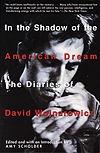IN THE SHADOW OF THE AMERICAN DREAM
For nostalgic old fucks like me who continue to think Joy Division and
Throbbing
Gristle are relevant, the work of David Wojnarowicz seems no less
compelling for his having died eight years ago.
 Wojnarowicz began to make
his name in the eighties art world but for all his energy (he seemed to
have worked in almost every art form), he never reached the star status
of a Haring or Basquiat. And perhaps that's given his art an
afterlife and continued vitality which overexposure drained from the
work of many artists from that decade. This isn't to say he hasn't
received widespread attention--it's possible to find his painting, music,
performances, and writings gathered on a CDROM (Optic Nerve), and in
1995 DC even released a comic book from a scenario he'd written. Yet
it's rare for anyone to invite strangers in to examine their lives, much
less the details of a life as roving, strange, and tragic as David
Wojnarowicz.
Wojnarowicz began to make
his name in the eighties art world but for all his energy (he seemed to
have worked in almost every art form), he never reached the star status
of a Haring or Basquiat. And perhaps that's given his art an
afterlife and continued vitality which overexposure drained from the
work of many artists from that decade. This isn't to say he hasn't
received widespread attention--it's possible to find his painting, music,
performances, and writings gathered on a CDROM (Optic Nerve), and in
1995 DC even released a comic book from a scenario he'd written. Yet
it's rare for anyone to invite strangers in to examine their lives, much
less the details of a life as roving, strange, and tragic as David
Wojnarowicz.
These diaries span the twenty years from Wojnarowicz's late adolescence to his grinding descent into death at the teeth of AIDS-related illnesses. He is from the start an engaging guy living through extreme circumstances. The first set of entries rise from an Outward Bound experience which set him alone on a New England island with nothing but what he could scavenge to eat. He is far more miserable there than he ever was hustling in Times Square, and returns with a renewed gratitude for all the pleasures of grimy city life. He is very keen on those pleasures, detailing with great care the warehouse cruising scene, the dislocated anomie of late night wandering, and his first experience shooting heroin. But he also loved travelling, and felt that he carried the great western openness inside him after hitching across the US. Kerouac and Burroughs played a large part in developing his poetic vision; in the diaries we can see Wojnarowicz move from somewhat labored imitation to the development of a beat style all his own.
He had a deep need to express what you could call the ineffable, what can't be expressed, sometimes using the graphic qualities of his art as a hieroglyphic text, and other times working his diary entries into a poetic fever. The visual and the written often seem part of the same flow, an attempt to burrow into fleeting desires and impressions to find in them some almost mystical quality, the secret which made them so striking. "Walked among the tomb-silent buildings, marble structures pushing up from the ground with glass squares nodding sections of airless winter sky, rusty cans and newspaper drifted across dirt lots and the surfaces of walkways, a feeling of nausea at the soundlessness of things, at hands surging from the ends of my coat sleeves." It's not the echoes of Burroughs, but the hands surging from his coat sleeves which catch you.
The end is harrowing, and David Wojnarowicz chronicles his hatred of his sickness as well as his loathing of the healthy with grim honesty. The very length of time he has to spend knowing he's infected and can do little about it (his body couldn't tolerate AZT), is a torment which makes suicide or death by accident seem appealing. He describes the excruciating process of having his bone marrow sampled ("I think I got kicked by a tiny mule in my sleep"), and resigns himself to a month of blood testing every other day as he undergoes trials for experimental drugs. It's not an uplifting portrait; there is no triumph in the face of his own mortality, his illnesses are too prolonged and exhausting for him to deceive himself with false consolation. Instead, he grows steadily more inward and isolated, hoping he can find some relief in death. At this point, you can only wish he did.
 Wojnarowicz began to make
his name in the eighties art world but for all his energy (he seemed to
have worked in almost every art form), he never reached the star status
of a Haring or Basquiat. And perhaps that's given his art an
afterlife and continued vitality which overexposure drained from the
work of many artists from that decade. This isn't to say he hasn't
received widespread attention--it's possible to find his painting, music,
performances, and writings gathered on a CDROM (Optic Nerve), and in
1995 DC even released a comic book from a scenario he'd written. Yet
it's rare for anyone to invite strangers in to examine their lives, much
less the details of a life as roving, strange, and tragic as David
Wojnarowicz.
Wojnarowicz began to make
his name in the eighties art world but for all his energy (he seemed to
have worked in almost every art form), he never reached the star status
of a Haring or Basquiat. And perhaps that's given his art an
afterlife and continued vitality which overexposure drained from the
work of many artists from that decade. This isn't to say he hasn't
received widespread attention--it's possible to find his painting, music,
performances, and writings gathered on a CDROM (Optic Nerve), and in
1995 DC even released a comic book from a scenario he'd written. Yet
it's rare for anyone to invite strangers in to examine their lives, much
less the details of a life as roving, strange, and tragic as David
Wojnarowicz.
These diaries span the twenty years from Wojnarowicz's late adolescence to his grinding descent into death at the teeth of AIDS-related illnesses. He is from the start an engaging guy living through extreme circumstances. The first set of entries rise from an Outward Bound experience which set him alone on a New England island with nothing but what he could scavenge to eat. He is far more miserable there than he ever was hustling in Times Square, and returns with a renewed gratitude for all the pleasures of grimy city life. He is very keen on those pleasures, detailing with great care the warehouse cruising scene, the dislocated anomie of late night wandering, and his first experience shooting heroin. But he also loved travelling, and felt that he carried the great western openness inside him after hitching across the US. Kerouac and Burroughs played a large part in developing his poetic vision; in the diaries we can see Wojnarowicz move from somewhat labored imitation to the development of a beat style all his own.
He had a deep need to express what you could call the ineffable, what can't be expressed, sometimes using the graphic qualities of his art as a hieroglyphic text, and other times working his diary entries into a poetic fever. The visual and the written often seem part of the same flow, an attempt to burrow into fleeting desires and impressions to find in them some almost mystical quality, the secret which made them so striking. "Walked among the tomb-silent buildings, marble structures pushing up from the ground with glass squares nodding sections of airless winter sky, rusty cans and newspaper drifted across dirt lots and the surfaces of walkways, a feeling of nausea at the soundlessness of things, at hands surging from the ends of my coat sleeves." It's not the echoes of Burroughs, but the hands surging from his coat sleeves which catch you.
The end is harrowing, and David Wojnarowicz chronicles his hatred of his sickness as well as his loathing of the healthy with grim honesty. The very length of time he has to spend knowing he's infected and can do little about it (his body couldn't tolerate AZT), is a torment which makes suicide or death by accident seem appealing. He describes the excruciating process of having his bone marrow sampled ("I think I got kicked by a tiny mule in my sleep"), and resigns himself to a month of blood testing every other day as he undergoes trials for experimental drugs. It's not an uplifting portrait; there is no triumph in the face of his own mortality, his illnesses are too prolonged and exhausting for him to deceive himself with false consolation. Instead, he grows steadily more inward and isolated, hoping he can find some relief in death. At this point, you can only wish he did.



